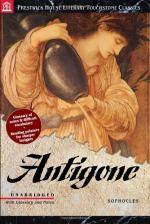|
This section contains 1,707 words (approx. 6 pages at 300 words per page) |

|
Role of Fate and Destiny in "Medea" and "Antigone"
Summary: The ancient Greek tragedies "Medea" by Euripides and "Antigone" by Sophocles reflect the belief in that era that a person's life is guided by fate and destiny imposed by the gods. This literature gives us insight to ancient Greek society and culture.
They say that literature is a reflection of life. One of the ways we study, and obtain knowledge about various time periods in the past, is by studying the literature written in these periods. It helps us to gain an insight into the society at this time.
`Medea' by Euripides, is an ancient Greek tragedy, and during this time, society was plagued by blind Fate in the Gods. Euripides echoes the views of society when he said "I have found power in the mysteries of thought, exaltation in the changing of the Muses, I have been versed in the reasonings of men, but Fate is stronger than anything I have known." This was the general view of the people during this time. Everything that happened, happened for a reason, and this reason was the will of the Gods. Everything was part of some elaborate design laid down by...
|
This section contains 1,707 words (approx. 6 pages at 300 words per page) |

|


